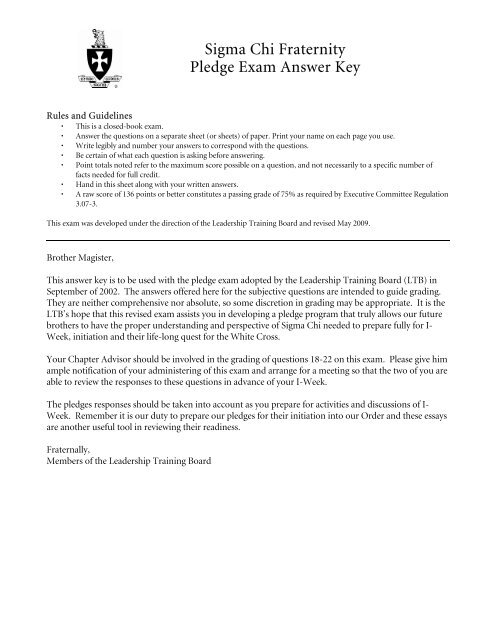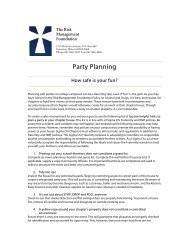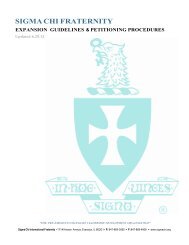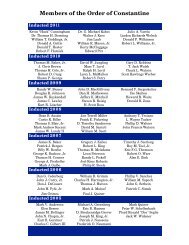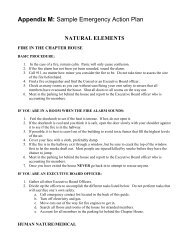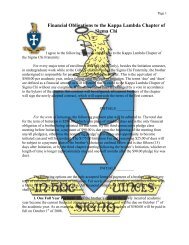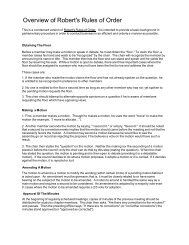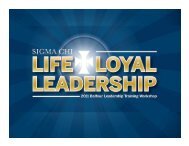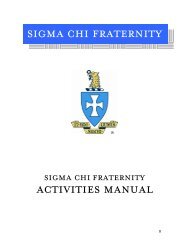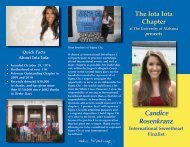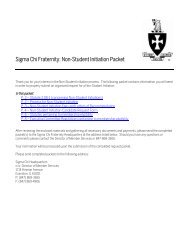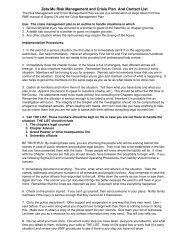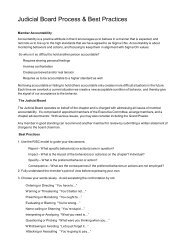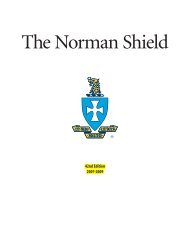vacation request form - Sigma Chi Fraternity
vacation request form - Sigma Chi Fraternity
vacation request form - Sigma Chi Fraternity
You also want an ePaper? Increase the reach of your titles
YUMPU automatically turns print PDFs into web optimized ePapers that Google loves.
<strong>Sigma</strong> <strong>Chi</strong> <strong>Fraternity</strong><br />
Pledge Exam Answer Key<br />
Rules and Guidelines<br />
• This is a closed-book exam.<br />
• Answer the questions on a separate sheet (or sheets) of paper. Print your name on each page you use.<br />
• Write legibly and number your answers to correspond with the questions.<br />
• Be certain of what each question is asking before answering.<br />
• Point totals noted refer to the maximum score possible on a question, and not necessarily to a specific number of<br />
facts needed for full credit.<br />
• Hand in this sheet along with your written answers.<br />
• A raw score of 136 points or better constitutes a passing grade of 75% as required by Executive Committee Regulation<br />
3.07-3.<br />
This exam was developed under the direction of the Leadership Training Board and revised May 2009.<br />
Brother Magister,<br />
This answer key is to be used with the pledge exam adopted by the Leadership Training Board (LTB) in<br />
September of 2002. The answers offered here for the subjective questions are intended to guide grading.<br />
They are neither comprehensive nor absolute, so some discretion in grading may be appropriate. It is the<br />
LTB’s hope that this revised exam assists you in developing a pledge program that truly allows our future<br />
brothers to have the proper understanding and perspective of <strong>Sigma</strong> <strong>Chi</strong> needed to prepare fully for I-<br />
Week, initiation and their life-long quest for the White Cross.<br />
Your Chapter Advisor should be involved in the grading of questions 18-22 on this exam. Please give him<br />
ample notification of your administering of this exam and arrange for a meeting so that the two of you are<br />
able to review the responses to these questions in advance of your I-Week.<br />
The pledges responses should be taken into account as you prepare for activities and discussions of I-<br />
Week. Remember it is our duty to prepare our pledges for their initiation into our Order and these essays<br />
are another useful tool in reviewing their readiness.<br />
Fraternally,<br />
Members of the Leadership Training Board
Note: For questions 1-4 please consult the most recent directory in The Magazine of <strong>Sigma</strong> <strong>Chi</strong>.<br />
1. Name the current Grand Consul. List two of his specific responsibilities. (3 points max)<br />
a. oversees operations of the fraternity<br />
b. chairs Executive Committee, Grand Chapter, <strong>Sigma</strong> <strong>Chi</strong> Corporation<br />
c. authorized to interpret and enforce the Ritual, Constitution, Statutes<br />
d. appoints committees<br />
(1 point for correct name, 1 point for each responsibility)<br />
2. Name the current Grand Pro Consul. List two of his specific responsibilities. (3 points max)<br />
a. serves as vice-chair of Executive Committee<br />
b. chairs Grand Council<br />
c. assumes duties of Grand Consul should he be unable to per<strong>form</strong> them<br />
(1 point for correct name, 1 point for each responsibility)<br />
3. Name the current Grand Quaestor. List two of his specific responsibilities. (3 points max)<br />
a. oversees the finances of the <strong>Fraternity</strong><br />
b. prepares the fraternity’s budget<br />
c. makes financial reports to the Grand Chapter and Grand Council<br />
(1 point for correct name, 1 point for each responsibility)<br />
4. Name the Grand Praetor for your province. List two of his responsibilities. (3 points max)<br />
a. provides general advice to the chapter<br />
b. visits each chapter in the province at least once per year<br />
c. authorized to enforce the <strong>Fraternity</strong>’s governing laws<br />
d. appoints chapter advisors<br />
e. appoints undergraduate representatives to the Grand Council<br />
(1 point for correct name, 1 point for each responsibility)<br />
5. List two <strong>form</strong>al responsibilities and the names of the brothers who currently serve as Consul, Pro<br />
Consul, Annotator, Quaestor and Magister for your chapter. (15 points max)<br />
(1 point for correct name, 1 point for each responsibility)<br />
a. Consul<br />
i. serves as president of the chapter<br />
ii. presides over chapter meetings<br />
iii. cares for security of the Ritual, ritualistic items, and the chapter’s charter<br />
iv. serves as chief liaison with campus officials, alumni advisors, and <strong>Fraternity</strong> officials<br />
b. Pro Consul<br />
i. serves as vice president of the chapter<br />
ii. chairs the chapter’s executive committee<br />
iii. assumes duties of the Consul in his absence<br />
c. Annotator<br />
i. keeps minutes of chapter meetings<br />
ii. maintains chapter bylaws, administrative files, and other records<br />
d. Quaestor<br />
i. serves as treasurer of the chapter
ii. collects and safeguards all chapter funds<br />
iii. prepares the chapter’s budget<br />
iv. provides financial reports to <strong>Fraternity</strong> officials<br />
e. Magister<br />
i. guides the pledge education program<br />
ii. assures that the pledge period and the program itself are strictly consistent with <strong>Sigma</strong> <strong>Chi</strong><br />
ideals and laws<br />
6. List the name and responsibilities of the brother currently serving as your chapter’s advisor. (1 point<br />
for name, 1 point for any responsibilities)<br />
a. serves as the chairman of the chapter advisory board<br />
b. works directly with chapter officers and executive committee<br />
c. serves as a liaison with the Grand Praetor, alumni, university, and the General <strong>Fraternity</strong><br />
7. List four services or resources provided by the <strong>Sigma</strong> <strong>Chi</strong> Headquarters staff. (4 points max)<br />
(1 point for each service or resource listed)<br />
a. publishes The Magazine of <strong>Sigma</strong> <strong>Chi</strong><br />
b. publishes officer and program manuals<br />
c. offers consultation for chapter financial management<br />
d. maintains initiation and membership records<br />
e. administers a range of <strong>Fraternity</strong> meetings, conferences, and programs<br />
f. supports work of Grand Officers and other alumni volunteers<br />
g. administers <strong>Fraternity</strong> award programs<br />
h. assist with chapter development and expansion<br />
i. coordinates chapter insurance program<br />
8. Please place a mark (X) by all the following statements that are true about the <strong>Sigma</strong> <strong>Chi</strong> <strong>Fraternity</strong>.<br />
(21 points)<br />
(1 point each for correctly marking--or not marking--each statement)<br />
“X”- signifies a answer that is “TRUE”<br />
a. X <strong>Sigma</strong> <strong>Chi</strong> is a non-profit organization governed by its membership and supported by a<br />
comparatively small professional staff.<br />
b. X The Grand Chapter is the supreme legislative body of the <strong>Fraternity</strong>.<br />
c. X The Grand Chapter includes voting delegates from each of the active undergraduate and<br />
alumni chapters.<br />
d. X The Grand Chapter elects officers of the <strong>Fraternity</strong>.<br />
e. X The Grand Chapter has the authority to amend the Constitution and Statutes of the <strong>Fraternity</strong>.<br />
f. The Grand Council is composed of <strong>form</strong>er Grand Officers and holds no <strong>form</strong>al authority.<br />
g. Chapter Consuls are automatically members of the Grand Council.<br />
h. All chapters elect an undergraduate representative to the Grand Council<br />
i. X The Grand Council convenes in years in which the Grand Chapter does not.<br />
j. X Grand Officers are unpaid volunteers.<br />
k. X The Grand Consul is the international president of the <strong>Fraternity</strong>.<br />
l. Only the Grand Consul can authorize changes to the Ritual.<br />
m. The Grand Tribune is the treasurer of the fraternity.<br />
n. Grand Praetors serve life terms.<br />
o. X The Executive Committee oversees the <strong>Fraternity</strong> budget and expenditures.<br />
p. X The <strong>Sigma</strong> <strong>Chi</strong> Foundation is a separate charitable corporation that supports the <strong>Fraternity</strong>’s<br />
educational initiatives.
q. X The <strong>Sigma</strong> <strong>Chi</strong> Foundation awards scholarship grants to individuals, and sponsors a range of<br />
programs, including Horizons and Balfour Leadership Training Workshop.<br />
r. X The Executive Director manages the <strong>Sigma</strong> <strong>Chi</strong> Headquarters and staff and reports to the<br />
Executive Committee.<br />
s. The <strong>Sigma</strong> <strong>Chi</strong> Headquarters staff holds ultimate authority in all matters related to <strong>Sigma</strong> <strong>Chi</strong>.<br />
t. X The Risk Management Foundation offers property, casualty, and general<br />
u. liability insurance to undergraduate and alumni chapters and house corporations.<br />
v. X There are undergraduate members of the Executive Committee and Leadership Training Board.<br />
9. Provide in<strong>form</strong>ation about the Seven Founders of <strong>Sigma</strong> <strong>Chi</strong>. For each founder, list his full name, a<br />
trait or virtue with which he is associated, and at least one specific contribution to <strong>Sigma</strong> <strong>Chi</strong> for<br />
which he is remembered. (21 points--1 point for correct full name, 1 point for associated trait, 1<br />
point for contribution)<br />
a. Thomas Cowan Bell<br />
i. Traits: “Qualities of learning,” or “instilled an atmosphere of friendship” (or very close<br />
synonym)<br />
ii. Exemplified:<br />
(1). -was especially good-hearted and generous<br />
(2). -had natural teaching talents and became an educator, scholarly<br />
(3). -his aunt’s home was in<strong>form</strong>ally considered the first chapter house of <strong>Sigma</strong> <strong>Chi</strong><br />
b. James Parks Caldwell<br />
i. Traits: “True to principle,” faithful, loyal, scholarly, “spirit of youth” (or very close<br />
synonym)<br />
ii. Exemplified:<br />
(1). -especially intelligent and creative, made remarkable literary contributions to the<br />
chapter<br />
(2). -accurate in knowledge, respected and loved<br />
(3). -when captured during the Civil War, rejected an offer of freedom on condition that<br />
he renounce the Confederacy<br />
c. Daniel William Cooper<br />
i. Traits: “Ruler of the spirit,” moral and spiritual, kindly and generous, honest, upright, and<br />
pure, considerate, humble (or very close synonym)<br />
ii. Exemplified:<br />
(1). -particularly well-regarded among the founders and considered the leader<br />
(2). -was the first Consul of Alpha Chapter<br />
(3). -a resort for those in trouble<br />
(4). -set an example by being rich of spirit despite being poor in worldly goods<br />
d. Isaac M. Jordan<br />
i. Traits: “Energetic and faithful to every task,” boundless energy, lofty aspirations, untiring<br />
perseverance, strong will, determined purpose, (or very close synonym)<br />
ii. Exemplified:<br />
(1). -set an example by holding lofty aspirations and being a “self-made” man<br />
(2). -delineated the criteria for pledging new members, now known as the Jordan<br />
Standard<br />
(3). -helped organize two Grand Chapters<br />
e. William Lewis Lockwood<br />
i. Traits: “Honest and trustworthy through life,” organizer, culturally refined, polished<br />
manners (or very close synonym)<br />
ii. Exemplified:<br />
(1). -considered the businessman of the <strong>Fraternity</strong>, he knew how to manage money and<br />
finances
(2). -his organizational skills were largely responsible for the survival of the young<br />
fraternity<br />
(3). -was the first treasurer of Alpha Chapter<br />
(4). -designed badge with Runkle<br />
f. Benjamin Piatt Runkle<br />
i. Traits: “Courageous in spirit and idealism,” forceful, admired heroism, spirit and idealism,<br />
(or very close synonym)<br />
ii. Exemplified:<br />
(1). -famous for casting off his Deke pin during the confrontation with Millikin and<br />
Reid<br />
(2). -had a particularly noteworthy military career and was wounded at the Battle of<br />
Shiloh<br />
(3). -persuaded other founders to base <strong>Sigma</strong> <strong>Chi</strong> symbolism on the story of<br />
Constantine’s vision because he was impressed by the emperor’s idealism and<br />
courage<br />
(4). -designed the original badge with Lockwood<br />
g. Franklin Howard Scobey<br />
i. Traits: “Courteous and loyal in friendship,” enthusiasm, cheerful, sunny, selfless,<br />
encouraging (or very close synonym)<br />
ii. Exemplified:<br />
(1). -set an example with his constantly cheerfulness and encouragement gave new heart<br />
(2). -seen as embodiment of “Spirit of <strong>Sigma</strong> <strong>Chi</strong>”<br />
(3). -encouraged Lockwood to join the circle of founders<br />
10. Select any founder whose qualities you admire and describe his unique contributions to <strong>Sigma</strong> <strong>Chi</strong>.<br />
Briefly discuss how a leader with those qualities could contribute to your own chapter. (6 points)<br />
This question is an opportunity for the pledge to expand on the characteristics of a particular founder, and<br />
to consider the practical benefits of value-based leadership. For full credit, he must give accurate<br />
in<strong>form</strong>ation about the founder and his contributions. While there is no absolute answer to the second part<br />
of the question, the pledge should offer observations that show thoughtfulness, particularly with examples<br />
from personal experience.<br />
(3 points for part one, 3 points for part two)<br />
11. Describe the fundamental issues that lead to the founding of <strong>Sigma</strong> <strong>Chi</strong>. (9 points)<br />
There was disagreement at Kappa Chapter of DKE at Miami University over the election of the poet of<br />
Erodelphian Literary Society. Erodelphians Caldwell, Jordan, Scobey, and Runkle refused to vote for a<br />
DKE brother whom they considered unqualified for the honor. DKEs Bell and Cooper agreed and took<br />
their side against the remaining six members of the DKE chapter. Both sides refused to change position.<br />
When confronted by Minor Millikin, a DKE alumnus who wished to expel Runkle and Scobey and<br />
discipline the others, Runkle tossed down his DKE pin and said, “I did not join this fraternity to be<br />
anyone’s tool. And that, sir, is my answer!” The other five followed him out the door. All six were<br />
subsequently expelled from the DKE.<br />
Joined by non-DKE Lockwood, they organized a new fraternity, meeting in rooms occupied by Runkle and<br />
Caldwell on the second floor of a building in Oxford. It was there that Runkle and Lockwood designed the<br />
first badge, exactly as it is today except for the Greek letters. (They initially chose the letters <strong>Sigma</strong> Phi, but<br />
changed them to <strong>Sigma</strong> <strong>Chi</strong>). After creating a ritual and constitution, the founders announced the birth of<br />
the new fraternity on June 28, 1855.<br />
(3 points for minimal explanation; 6 points for good explanation; 9 points for command of concepts)
12. List the exact dates of the founding of <strong>Sigma</strong> <strong>Chi</strong> and of the establishment of your chapter. (2 points<br />
– 1 point each)<br />
a. <strong>Sigma</strong> <strong>Chi</strong>: June 28, 1855<br />
b. Your chapter: consult Charter or chapter history<br />
13. As inspiration for several symbolic themes in <strong>Sigma</strong> <strong>Chi</strong> (including the public motto and the design<br />
of the badge), the founders embraced the story of Constantine and his most famous battle. Briefly<br />
discuss why they viewed Constantine’s vision and subsequent victory as a fitting basis for certain<br />
fraternal lessons. (6 points)<br />
According to history and legend, Constantine’s victory was achieved by virtue of military strategy and by<br />
the sheer inspiration of religious principles. The Founders were inspired by the story of Constantine as a<br />
heroic leader of men, and with the story of the vision of the cross. The founders broke away from DKE and<br />
<strong>form</strong>ed a new fraternity on the basis of principle. Furthermore, they believed that to achieve the<br />
<strong>Fraternity</strong>’s purposes, the motivation needed to be the pursuit of ideals rather than a set of rules. The<br />
founders saw the symbolic parallel between Constantine’s adoption of principles to achieve his goals, and<br />
their own adoption of principles to achieve the fraternity’s goals.<br />
(2 points for minimal discussion, 4 points for good discussion, 6 points for command of concepts)<br />
14. Write The <strong>Sigma</strong> <strong>Chi</strong> Creed. Describe in your own words the meaning of its fundamental themes.<br />
(10 points)<br />
a. [CREED]<br />
b. This statement affirms the idea that good reputation is earned through the actions and attitudes of<br />
those with good character. It also makes explicit the obligation of all members to preserve the<br />
<strong>Fraternity</strong>’s good reputation. There is mutual benefit, since members enjoy association with a<br />
highly regarded organization, and the <strong>Fraternity</strong> is strengthened by being represented by members<br />
who are worthy of respect and admiration. Explanation of personal experiences that display<br />
understanding of Creed themes are exemplary.<br />
(4 points for accurate “Creed”--may award fewer points for omissions; 2 additional points for minimal discussion,<br />
or 4 additional points for good discussion, or 6 additional points for command of concepts)<br />
15. Write The Spirit of <strong>Sigma</strong> <strong>Chi</strong>. Discuss in your own words its meaning. (10 points)<br />
a. [SPIRIT]<br />
b. The founders realized that friendships come relatively easily among people who think alike, have<br />
similar backgrounds, and share interests. When friendships are <strong>form</strong>ed between those who think<br />
differently, have different backgrounds, or have different interests, the bonds tend to be deeper and<br />
longer lasting than those based on more superficial commonalities. In addition, one learns more<br />
from relationships with those who have different experiences, personalities, and points of view<br />
than he does from those who are like himself. In <strong>Sigma</strong> <strong>Chi</strong>, the source of unity among brothers is<br />
shared beliefs about the nature of friendship, fairness (justice), and the value of education and<br />
accumulation of knowledge (learning). Although they are obligated to practice those core ideals,<br />
brothers are encouraged to exercise their own sense of good judgment and to be true to<br />
themselves. Explanation of personal experiences of diversity while sharing common beliefs is<br />
exemplary.<br />
(4 points for accurate “Spirit”--may award fewer points for omissions; 2 additional points for minimal discussion, or<br />
4 additional points for good discussion, or 6 additional points for command of concepts)
16. Founder Jordan delivered a speech to the 1884 Grand Chapter outlining the minimum requirements<br />
for the recruitment of new members. He outlined in his speech the need for “men of good<br />
character." Define in your own words the meaning of good character and why it is in <strong>Sigma</strong> <strong>Chi</strong>’s<br />
interest to seek men who already possess that quality. (10 points)<br />
a. Given the idealistic aims of the <strong>Fraternity</strong>, it stands to reason that we consider for membership<br />
only those who have the desire and capacity to join our cause with sincerity and with personal<br />
qualities that are consistent with our high expectations. All of the <strong>Fraternity</strong>’s purposes and ideals<br />
are based on commonly accepted standards of good character and behavior, so it would be<br />
counterproductive to seek members who do not already posses and demonstrate basic good values.<br />
The values stated in the Jordan Standard are relevant to <strong>Sigma</strong> <strong>Chi</strong>’s greater aims, but are the<br />
minimum expectations for prospective members.<br />
b. The use of personal views of meeting the standard of “good character” are exemplary.<br />
(3 points for minimal discussion; 7 for good discussion; 10 points for command of concepts)<br />
17. State the fundamental purpose of <strong>Sigma</strong> <strong>Chi</strong> as expressed in the Governing Laws. Describe briefly<br />
why these “high ideals” are foremost in our vision for the fraternity. (8 points)<br />
a. “To cultivate and maintain the high ideals of friendship, justice, and learning upon which <strong>Sigma</strong><br />
<strong>Chi</strong> was founded.” (or a close approximation of this statement).<br />
b. The desire to cultivate friendships during our college years is natural. At the time of our founding<br />
the founders were in search of justice. Justice is found in men of good character, common<br />
decency, and fairness. The ultimate reason for our being in college is for learning. Therefore,<br />
members who demonstrate good values and who are active thinkers and learners will ultimately<br />
enhance our friendships.<br />
(2 points for correct identification of fundamental purpose, 2 additional points for minimal discussion, or 4<br />
additional points for good discussion, or 6 additional points for command of concepts)<br />
18. Describe what you understand to be the essential responsibilities of being a member of the <strong>Sigma</strong><br />
<strong>Chi</strong> <strong>Fraternity</strong>. (9 points)<br />
a. To live up to the attributes expressed in writings such as the <strong>Sigma</strong> <strong>Chi</strong> Creed (e.g., uphold the<br />
reputation of <strong>Sigma</strong> <strong>Chi</strong> with character growth).<br />
b. To act in a brotherly way to all members at all times.<br />
c. To fulfill obligations as a member of the organization (e.g., payment of dues; participation in<br />
chapter meetings and activities).<br />
d. Striving for the ideals of the <strong>Fraternity</strong>.<br />
e. Hold my Brothers accountable for these same responsibilities.<br />
(2 points for each responsibility)<br />
19. Discuss your understanding of the concept of brotherhood (in contrast to simple friendship) in<br />
context of <strong>Sigma</strong> <strong>Chi</strong>. What appeals to you about this concept and in what ways have you seen it<br />
exemplified in your chapter? (18 points)<br />
a. While friendship is a fundamental aim of the <strong>Fraternity</strong>, brotherhood in <strong>Sigma</strong> <strong>Chi</strong> cannot be<br />
defined as a mere group of social friends. <strong>Sigma</strong> <strong>Chi</strong> brotherhood occurs when members live up to<br />
commitments they have made to a set of ideals--ideals about friendship and about character.<br />
Although two members may not consider each other to be “best friends,” they can nevertheless see<br />
each other as brothers, willing to accord each other the respect and support expected of all <strong>Sigma</strong><br />
<strong>Chi</strong>s. In this sense, brotherhood constitutes a higher order of friendship. The principles of<br />
brotherhood faithfully practiced by <strong>Sigma</strong> <strong>Chi</strong>s have consistently yielded lasting ties between
individual brothers. Just as importantly, the nature of our brotherhood creates bonds between<br />
members from different chapters and different eras. This happens precisely because the <strong>Fraternity</strong><br />
is based on shared values and a purpose, which is why two members may meet for the first time,<br />
yet feel an authentic connection as brothers. The concept of brotherhood reaches it’s highest order,<br />
when it is apparent that there are many aspects of shared values apparent (caring, helping,<br />
enabling, sharing, loving, holding accountable, striving, etc.) Explanation of personal experiences<br />
that contrast friendship and brotherhood, or are examples of highest order aspects, are exemplary.<br />
(6 points for minimal discussion—maybe didn’t answer all parts; 12 points for good discussion—answered all parts;<br />
18 points for command of concepts—thoroughly answered all parts)<br />
NOTE: Questions 20 and 21 are “personal reflections.” These questions are designed to give the pledge an opportunity to reflect on<br />
his involvement in <strong>Sigma</strong> <strong>Chi</strong>. There can be no “correct” answer, yet it is more than reasonable to expect the pledge to provide<br />
thoughtful responses. After all, one’s promise as a strong, contributing brother is almost entirely a question of attitude and desire.<br />
These questions should be graded with the same thoughtfulness, giving weight to sincere effort, even in the absence of eloquence.<br />
20. What contributions would you make to your chapter as a member? (9 points)<br />
21. How do you envision your involvement in <strong>Sigma</strong> <strong>Chi</strong> throughout your life? (9 points)<br />
(3 points for minimal discussion; 6 points for good discussion; 9 points for exemplary discussion)


